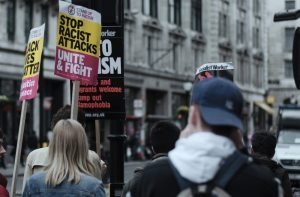Criminal Justice
Canada is recognizing the International Decade for People of African Descent. It’s a key opportunity to address anti-Black racism in the justice system.
rime Minister Justin Trudeau recently gave a short but significant speech on Parliament Hill announcing that the Government of Canada is officially recognizing the International Decade for People of African Descent. The decade, from 2015 to 2024, was proclaimed by the United Nations General Assembly in 2014.
In his remarks, Trudeau recognized that chief among the issues and challenges particularly affecting Black people in Canada is their overrepresentation in the corrections system. In particular, the Prime Minister said: “We know that the interaction between Black Canadians and the corrections system as a whole faces a host of challenges, from discrimination in policing, to overrepresentation in our prisons. The percentage of inmates in our prisons who are Black is 8.6 percent, despite Black Canadians accounting for only 3.5 percent of the general population.”
The prime minister’s speech and accompanying official statement are a welcome step forward, as they mark an unprecedented official acknowledgement by a sitting Canadian prime minister of the pernicious and pervasive impacts of anti-Black racism. More importantly, the recognition of the International Decade is an opportunity to root out the underlying causes of criminalization of Black Canadians and to take meaningful steps toward eliminating anti-Black racism in criminal justice systems.
Chronic criminalization of Black people in Canada
As I outlined recently in Policy Options, systemic anti-Black racism in Canadian policing and courts goes back to at least the 1980s. Since then, it has continued to dramatically accelerate the rate of overrepresentation of Black people federally incarcerated in Canada.
For instance, in 2013, Canada’s Office of the Correctional Investigator (OCI) revealed in its 2012-13 Annual Report that between 2003 and 2013, the number of Black inmates in Canada’s federal prisons increased every year, growing by nearly 90 percent over that period, while the number of Caucasian inmates actually declined by three percent over the same time. While the acceleration rate of Black overrepresentation in Canada’s federal prisons has slowed moderately since then, the trend is still troublingly strong.
The OCI, referring to its 2013 findings, noted in its 2016-17 Annual Report: “Four years later very little appears to have changed for Black people in federal custody.”
While this pattern stands as its own threat to Canadian values of multiculturalism and equality, the problem is not an isolated one. These incarceration trends are not unconnected to the endemic practice of racial profiling, in the form of carding and street checks, which has recently been exposed as a Canada-wide phenomenon.
It is also important to note that Black people not only make up an inordinately high portion of the federal prison population but also experience some of the harshest treatment once inside. The practice of segregation, or solitary confinement, has been recognized by the United Nations as well as Canadian advocacy organizations and human rights agencies as a form of torture.
A 2015 report of the OCI stated that “the number of Black offender admissions to segregation and the number of offenders have increased significantly in the last 10 years”; from 2005 to 2015, the number of Black inmates sent to segregation increased by 100.4 percent. As reported by the Globe and Mail, “For that same 10-year period, aboriginal admissions to solitary increased 31.1 per cent.”
A criminal justice policy program for the decade
The UN’s International Decade for People of African Descent includes a detailed and thoughtful program of activities, intended to guide countries such as ours on how to implement the decade domestically. Special attention is paid in the program to eliminating anti-Black racism in criminal justice systems. States are called on to adopt 11 measures to ensure the protection and promotion of human rights of people of African descent. The measures range from basics that we in Canada take for granted, such as adopting equality laws and human rights tribunals, to more ambitious endeavours such as providing reparations for the ways the criminal justice system has perpetuated the logics and effects of state-sanctioned enslavement of people of African descent.
One of the serious criticisms of Trudeau’s announcement recognizing the decade is that it came without a substantive plan of action or articulation of a platform for policy change. The government of Canada has an opportunity to respond correctively to this legitimate critique by undertaking an official review of the UN’s program. While our country has adopted many of the program’s measures in some form, statistics show that major problems persist and have done for decades. So, the program’s measures should be used by our justice professionals to conduct an honest assessment of Canada’s progress and lack thereof in implementing access to justice for Black Canadians.
Prime Minister Justin Trudeau announces the Government of Canada is recognizing the International Decade for People of African Descent, on January 30, 2018. THE CANADIAN PRESS/Adrian Wyld
An added advantage of the UN program’s suggestions is that the measures proposed are articulated in a manner that speaks to the ways systemic anti-Black racism in the criminal justice system is both an inextricably linked cause and a consequence of its manifestation in other areas, such as poverty, employment, housing, health and education outcomes for Black people in Canada. In other words, to make substance of the thus far symbolic recognition of the international decade, Canada should seize the opportunity to pursue policy change grounded in the letter and spirit of the UN’s program of activities.
Toward criminal justice reform for African Canadians
For credible, evidence-based ideas on how to address the chronic criminalization of Black people in Canada, we need not look far. Prime Minister Trudeau, along with Canada’s Minister of Public Safety, Ralph Goodale, and our Attorney General and Minister of Justice, Jody Wilson-Raybould, should consult the October 2017 Report of the UN Working Group of Experts on People of African Descent on its mission to Canada.
The group visited Black Canadians in Toronto, Ottawa, Montreal and Halifax in October 2016 to learn about the experience of being Black in Canada. Sadly, but not surprisingly, during their visit, the members of the working group were immediately struck by the staggering racial disparities that existed in Canada’s criminal justice system. The group released a lengthy media statement and an extensive list of recommendations for improving criminal justice outcomes for Black people in Canada, saying that the mission had left members with “serious concerns about systemic anti-Black racism in the criminal justice system in Canada.”
Interestingly, the 2016-17 correctional investigator’s annual report endorses and repeats certain correctional justice reform recommendations made by the working group. These recommendations offer the most legitimate representation of the will of Black Canadians with respect to eliminating anti-Black racism in Canada’s criminal justice system.
To guide and sustain the process of prioritization and implementation of the recommendations of the UN working group and those of other credible sources, the government of Canada should take immediate steps toward establishing an African-Canadian justice portfolio within the Department of Justice, as well as a crime prevention and African-Canadian community safety division within Public Safety Canada.
A distinct policy approach for a distinct people
During Trudeau’s announcement, he affirmed one of the most important reasons for taking a targeted approach to anti-Black racism in Canada generally, and within the criminal justice system more specifically. Unlike any other prime minister before him, he noted that “people of African descent represent a distinct group.”
As a distinct group, Black Canadians require a distinct policy approach. African Canadians collectively endure unique and chronic challenges due to systemic anti-Black racism in Canada’s criminal justice system.
In his remarks, the Prime Minister noted that Canada needs to do “better” by Black Canadians. But, respectfully, I disagree.
After centuries of being deeply disadvantaged by this system, Black Canadians deserve a system that does more than just better, for “better” is an unconscionably low bar to meet. No, we’re calling for a system that actually lives up to its name and finally does us justice.
How? In the words of the Prime Minister, “Addressing the challenges facing Black Canadians requires participation from all Canadians.”
This article is curled from Policy Options and was written by Anthony Morgan
This post is also available in: French










